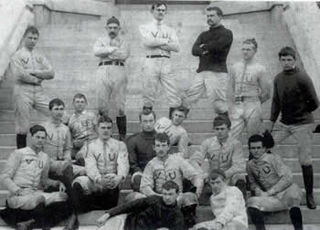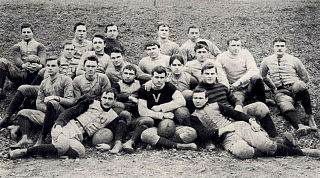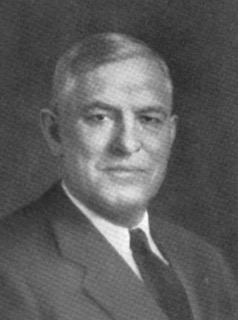
FirstBank Stadium is a football stadium located in Nashville, Tennessee. Completed in 1922 as the first stadium in the South to be used exclusively for college football, it is the home of the Vanderbilt University football team. When the venue was known as Vanderbilt Stadium, it hosted the Tennessee Oilers during the 1998 NFL season and the first Music City Bowl in 1998 and also hosted the Tennessee state high school football championships for many years.

The Vanderbilt Commodores are the intercollegiate athletic teams that represent Vanderbilt University, located in Nashville, Tennessee. Vanderbilt fields 16 varsity teams, 14 of which compete at the National Collegiate Athletic Association (NCAA) Division I level as a member of the Southeastern Conference (SEC). Vanderbilt's women's lacrosse team plays in the American Athletic Conference. The bowling team plays in Conference USA (C-USA), which absorbed Vanderbilt's former bowling home of the Southland Bowling League after the 2022–23 season. The University of Tennessee Volunteers are Vanderbilt's primary athletic rival, and the only other SEC team in Tennessee.

William Wallace Wade was an American football player and coach of football, basketball, and baseball, and college athletics administrator. He served as the head football coach at the University of Alabama from 1923 to 1930 and at Duke University from 1931 to 1941 and again from 1946 to 1950, compiling a career college football record of 171–49–10. His tenure at Duke was interrupted by military service during World War II. Wade's Alabama Crimson Tide football teams of 1925, 1926, and 1930 have been recognized as national champions, while his 1938 Duke team had an unscored upon regular season, giving up its only points in the final minute of the 1939 Rose Bowl. Wade won a total of ten Southern Conference football titles, four with Alabama and six with the Duke Blue Devils. He coached in five Rose Bowls including the 1942 game, which was relocated from Pasadena, California to Durham, North Carolina after the attack on Pearl Harbor.

The Southern Intercollegiate Athletic Association (SIAA) was one of the first collegiate athletic conferences in the United States. Twenty-seven of the current Division I FBS football programs were members of this conference at some point, as were at least 19 other schools. Every member of the current Southeastern Conference except Arkansas, Missouri and Oklahoma, as well as six of the 15 current members of the Atlantic Coast Conference formerly held membership in the SIAA.

The Vanderbilt Commodores football program represents Vanderbilt University in the sport of American football. The Commodores compete in the Football Bowl Subdivision (FBS) of the National Collegiate Athletic Association (NCAA) within the Southeastern Conference (SEC). They are led by head coach Clark Lea. Vanderbilt plays their home games at FirstBank Stadium, located on the university's Nashville, Tennessee campus.

The 2009 Vanderbilt Commodores football team represented Vanderbilt University during the 2009–10 college football season. The team's head coach was Bobby Johnson, who served his eighth season as the Commodores' head coach. Vanderbilt has been a member of the Southeastern Conference (SEC) since the league's inception in 1932, and has participated in that conference's Eastern Division since its formation in 1992. The Commodores played their six home games at Vanderbilt Stadium at Dudley Field in Nashville, Tennessee, which has been Vanderbilt football's home stadium since 1922. The Commodores finished the season 2–10 and 0–8 in SEC play.

The 1890 college football season was the season of American football played among colleges and universities in the United States during the 1890–91 academic year.

Elliott Hamilton Jones was an American football player and coach. He served as the first head football coach at Vanderbilt University. Jones played and coached with the Vanderbilt Commodores as team captain for three seasons from 1890 to 1892, compiling a record of 8–5. He went on to work as a lawyer, police commissioner and councilman in Kansas City, Missouri.

The 1891 Vanderbilt Commodores football team represented Vanderbilt University during the 1891 college football season. The team's head coach and team captain was Elliott H. Jones, who served his second season in that capacity. This was the first year that Vanderbilt had a schedule of opponents other than the school next door to them. Vanderbilt and Sewanee, charter members of the Southern Intercollegiate Conference, play their first game. The rivalry, typically reserved for Thanksgiving Day, continues into World War II. When the series ended in 1944, Vanderbilt owned a 40–8–4 advantage.

The 1892 Vanderbilt Commodores football team represented Vanderbilt University during the 1892 college football season. The team's head coach and team captain was Elliott H. Jones, who served his third and last season in that capacity. This was the first year for Vandy and University of Tennessee to play football also the first year to play at (Old) Dudley Field. The 1892 team was the oldest in the memory of Grantland Rice. He claimed Phil Connell then would be a good player in any era.

The 1897 Vanderbilt Commodores football team represent Vanderbilt University during the 1897 Southern Intercollegiate Athletic Association football season. Vanderbilt was in its eighth season of playing football; coached by R. G. Acton. The Commodores finished the season without being scored on. Vanderbilt played in the Southern Intercollegiate Athletic Association (SIAA) and won the SIAA Championship, the first claimed in school history.

The Sewanee–Vanderbilt football rivalry was an American college football rivalry between the Sewanee Tigers and Vanderbilt Commodores. They were both founding members of the Southern Intercollegiate Athletic Association (SIAA), the Southern Conference, and the Southeastern Conference (SEC). Both teams' histories feature some powerhouses of early Southern football, e.g. 1899 Sewanee Tigers football team and 1906 Vanderbilt Commodores football team. It was the oldest of Vanderbilt's rivalries; dating back to 1891 when Vanderbilt played its second ever football game and Sewanee played its first. Vanderbilt leads the series 40–8–4. It used to be claimed as the oldest rivalry in the south, older than the "South's Oldest Rivalry" between North Carolina and Virginia. Usually played towards the end of the season on Thanksgiving Day, the two teams have not met again since 1944.
The 1918 Vanderbilt Commodores football team represented Vanderbilt University in the 1918 Southern Intercollegiate Athletic Association football season, which was interim head coach Ray Morrison's first year as a head coach. Morrison was asked to fill in for Dan McGugin who was in the United States Army at the time.

William Lofland Dudley was an American chemistry professor at both the University of Cincinnati and Vanderbilt University and an athletics pioneer during the Progressive Era. At Vanderbilt, he was appointed dean of its medical department. He was also once vice-president of the American Association for the Advancement of Science, and was notably director of affairs on the Tennessee Centennial Exposition executive committee.

Bradley Walker was a Nashville attorney who, in his youth, was found to be naturally proficient at virtually any sport he tried, including football, baseball, track, boxing, tennis and golf— in all these sports he either set records or won championships or awards.

The 1922 Michigan vs. Vanderbilt football game, played October 14, 1922, was a college football game between the Michigan Wolverines and Vanderbilt Commodores. The game ended as a scoreless tie. It was the inaugural game at Dudley Field, the first dedicated football stadium in the South.

Patrick Mann Estes was an American college football player, attorney, and founder, part owner, and general counsel of the Life and Casualty Company of Nashville.
The Vanderbilt Commodores football team represents Vanderbilt University in the sport of American football.

The Georgia Tech–Vanderbilt football rivalry is an American college football rivalry between the Georgia Tech Yellow Jackets and Vanderbilt Commodores. Both universities are founding members of the Southeastern Conference (SEC) and Southern Conference (SoCon), and Southern Intercollegiate Athletic Association (SIAA). Georgia Tech leads the series all time 20–15–3.

















